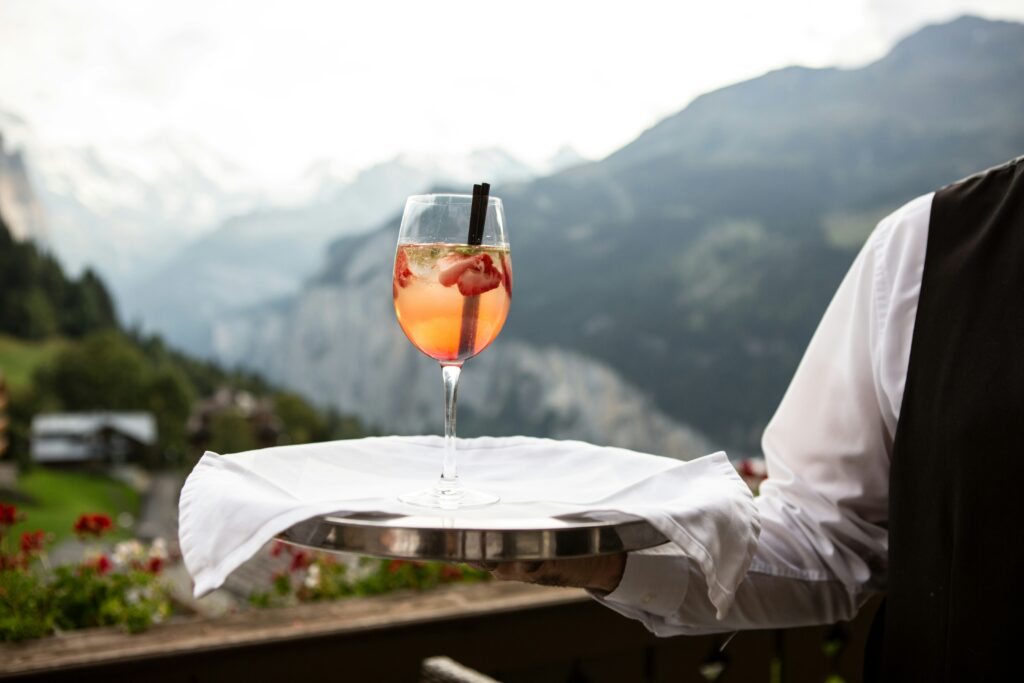F rom the “oikonomos” of ancient Greece to the refined professionals of today, the butler’s story reflects humanity’s evolving relationship with service, culture, and sophistication. A journey through centuries of tradition, adaptation, and timeless elegance.
The History of Butlers: From Ancient Greece to Modern Times
The history of the butler role spans many centuries, evolving from ancient times to the present day. Its origins are often linked to the management of household servants and estate operations. The term “butler” itself became more formalized in the medieval and Renaissance periods.
However, the general concept of managing domestic staff has existed in various forms since ancient Greece. This comprehensive overview explores the evolution of the butler role from ancient civilizations to 2025.
Understanding this rich history helps us appreciate how modern butler services have developed. Today’s professional butlers carry forward centuries of tradition while adapting to contemporary needs and technology.
Ancient Greece and Rome (8th Century BCE – 5th Century CE)
Domestic management was a critical function in wealthy households during ancient times. Aristocratic families in ancient Greece relied on trusted slaves or servants to oversee household operations. These individuals performed duties that would later be associated with the butler role.
Early Domestic Management in Ancient Greece
In ancient Greece, household managers oversaw wine cellars and managed guests with great care. The Greek term “oikonomos” referred to someone who managed the household economy. This included supervising staff, food preparation, and drink service.
These early household managers established the foundation for formal domestic service roles. Their responsibilities included ensuring proper hospitality and maintaining household standards that impressed guests and family members alike.
Roman Empire Household Management
Wealthy Roman families employed slaves known as household managers to organize domestic operations. These individuals managed kitchens, wine cellars, and guest reception with professional skill. The “cubicularius” oversaw sleeping quarters and ensured comfort for family members and guests.
While not yet butlers in the modern sense, these positions laid the groundwork for more formalized roles. Roman household management emphasized organization, efficiency, and exceptional service delivery that influenced later developments.
 The Middle Ages (5th to 15th Century)
The Middle Ages (5th to 15th Century)
The medieval period saw the emergence of the butler role as we recognize it today. Wealthy European households began to formalize domestic roles during this time. The position of butler became more distinct and specialized.
Emergence of the Butler Role
The term butler derives from the Old French word “bouteillier,” meaning “bottle bearer.” This person was responsible for wine and drink management. By the medieval period, the butler’s primary duty involved overseeing wine cellars and managing beverage storage.
Additionally, they ensured guests were served properly during feasts and gatherings. This role required knowledge of wines, proper service etiquette, and the ability to manage other servants effectively.
Butlers in Castles and Courts
In the 12th and 13th centuries, castles and grand estates flourished throughout medieval Europe. Butlers began playing more important roles in managing large households. In royal courts, butlers could oversee several servants and manage food and drink service to nobility.
The role was considered prestigious and often reserved for trusted, loyal servants. These butlers maintained high standards of hospitality and were responsible for the household’s reputation and guest satisfaction.
The Renaissance to the 18th Century (15th – 18th Century)
During the Renaissance, the butler role became more formalized and sophisticated. European aristocracy grew in wealth and power, making their households increasingly complex. Butler duties expanded significantly during this period.
Refinement and Formalization
In the 16th century, butlers managed all aspects of hospitality with greater sophistication. They oversaw kitchen staff and organized elaborate feasts with meticulous attention to detail. Ensuring guests received the highest respect became a primary responsibility.
By the 17th and 18th centuries, butlers became essential figures in royal and noble households. This was particularly true in Britain and France, where butler roles reached new levels of importance and prestige.
Senior Household Management
In England, butlers became senior household staff members, often holding the title of “head of the household.” When the master was absent, they maintained the estate and organized meal service. They also oversaw other staff, including valets, footmen, and chambermaids.
This expanded role required exceptional organizational skills and leadership abilities. Butlers needed to coordinate multiple departments while maintaining the highest service standards throughout the household.
The 19th Century (Victorian Era)
The 19th century, particularly the Victorian era, represented the golden age of the butler. The rise of the British Empire and industrial wealth made butlers symbols of social status and prestige.
The Golden Age of Butler Service
Victorian-era butlers were highly specialized professionals who managed everything from wine cellars to meal service. They maintained fine silverware and upheld the household’s reputation with exceptional skill and dedication.
Elite service became the standard, with butlers expected to be highly trained in manners and etiquette. They were often considered “gentlemen” in their own right, respected for their knowledge of aristocratic culture.
Comprehensive Butler Duties
Victorian butlers greeted guests, attended to the master and mistress, and managed household staff efficiently. They handled estate administration and maintained the household’s silver, china, and linens with meticulous care.
Additionally, they ensured proper meal presentation and coordinated complex household operations. This comprehensive approach to household management set the standard for modern butler services.
Early to Mid-20th Century (1900 – 1950s)
The butler role began to decline in the early 20th century due to significant social changes. Two World Wars, the rise of the middle class, and economic shifts affected traditional household structures.
Decline and Modernization
Many grand estates were sold or divided during this period, and the aristocracy lost some influence. However, in wealthier households, particularly in English-speaking countries, the butler role persisted with reduced responsibilities.
The role adapted to changing times while maintaining core service principles. Butlers continued serving in households that valued traditional service excellence and personal attention.
Hollywood and Popular Culture
The butler image was romanticized in popular culture, especially in Hollywood films. Characters like Alfred Pennyworth from Batman and Jeeves from P.G. Wodehouse became iconic representations of the ideal butler.
These fictional butlers were refined, discreet, and utterly devoted to service. They helped maintain public interest in butler services and established cultural expectations for professional household management.
Late 20th Century to Early 21st Century (1960s – 2024)
By the latter half of the 20th century, traditional butler roles had been largely supplanted by diverse household management positions. However, butlers remained features in high-society households, luxury hotels, and upscale services.
Modern Butler Adaptations
Butler duties became less about managing grand estates and more about providing personal services. They focused on managing household needs and providing specialized assistance to busy professionals and wealthy families.
The role evolved to include scheduling, travel arrangements, staff management, and security oversight. Some modern butlers even provided pet care and specialized concierge services.
Hotel and Hospitality Butlers
Luxury hotels introduced professional butlers who provided personalized services to guests. These services ranged from unpacking luggage to arranging exclusive events and reservations.
Hotel butlers became ambassadors of luxury hospitality, ensuring guests received exceptional care and attention. This adaptation helped preserve butler traditions while serving modern hospitality needs.
Technology Integration
With advancing technology, butler roles adapted to include digital tools and applications. Modern butlers used technology to handle bookings, purchases, and household operations management efficiently.
Some provided concierge-style services for busy executives and high-net-worth individuals. This technological integration enhanced service delivery while maintaining personal attention and care.
The Butlers of 2025: New Roles and Modern Adaptations
Today, the butler role remains alive and continues evolving significantly from its ancient origins. Modern butlers serve in various capacities while maintaining the core principles of exceptional service and personal attention.
Luxury Service Industry
Many luxury hotels, yachts, and private jets employ butlers who provide exceptional personal service. They manage itineraries, provide bespoke recommendations, and attend to any guest request with professional expertise.
These modern butlers combine traditional service excellence with contemporary hospitality standards. They create memorable experiences that reflect the highest levels of luxury and personal attention.
Private Home Butler Services
Some wealthy individuals still employ traditional butlers who manage household operations and personal needs. These professionals coordinate complex households while maintaining privacy and discretion.
Private home butlers adapt traditional skills to modern lifestyles, ensuring seamless household management. They provide personalized service that enhances daily life quality for discerning families.
High-Tech Butler Integration
With the rise of smart homes, some butlers now integrate technology into their work seamlessly. They manage smart appliances, home security systems, and virtual assistants with professional expertise.
This technological integration enhances service efficiency while maintaining the personal touch that defines excellent butler service. Modern butlers balance innovation with traditional service values.
The Enduring Legacy of Butler Service
Butlers continue to symbolize refinement, efficiency, and personalized service in high-end establishments today. They maintain a legacy that stretches from ancient Greece to the modern era, adapting to changing times while preserving core service principles.
The evolution of butler services demonstrates the enduring value of personalized attention and exceptional hospitality. From ancient household managers to modern luxury service professionals, butlers have consistently provided the highest standards of care and service.
Understanding this rich history helps us appreciate why butler services remain relevant in today’s world. The combination of traditional excellence and modern adaptability ensures that butler services will continue evolving to meet future needs while honoring their distinguished heritage.
Whether serving in private homes, luxury hotels, or specialized settings, today’s butlers carry forward centuries of service tradition. They represent the pinnacle of personalized hospitality and household management excellence.












